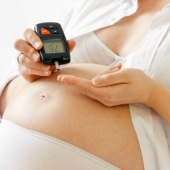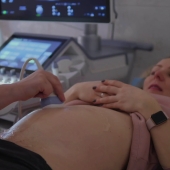Down syndrome affects one in every seven hundred babies born each year in the United States and now thanks to advanced breakthroughs there's a non-invasive screening option called NIPT, here to talk about this fairly new approach to prenatal testing from Alumina is genetic counselor Patty Winters.
What the difference between a screening test and a diagnostic test?
A screening test is a test that can tell us if there's a higher or a lower chance for certain medical conditions in a pregnancy, whereas the diagnostic tests usually a CVS or amniocentesis during pregnancy actually samples from the pregnancy and can tell us yes or no with as much certainty as possible whether those conditions are present.
NIPT is a type of screening test where we actually draw blood from a woman's arm and in her blood there is some cell free DNA from both herself and from the pregnancy and by analyzing that cell free DNA we're able to determine if there's a higher or lower chance for certain conditions in the pregnancy.
So some women will choose to have a screening test to get that information before deciding whether to have a diagnostic test because the diagnostic test carries a risk of complications including pregnancy loss.
So what does NIPT screen for?
It screens for changes in the number of certain chromosomes so most commonly we talk about Down syndrome which is trisomy 21 which is an extra copy of chromosome 21 but NIPT also screams for trisomy 18 which is also called Edwards syndrome and trisomy 13 which is also called Pito Syndrome and it also looks at the sex chromosomes to see if there's any missing or extra sex chromosomes.
This test specifically for women of advanced maternal age or are there other candidates?
So we know that these conditions can occur in any pregnancy. So there's a change for these with every pregnancy that any woman has but as you mentioned, there are pregnacy's that have a higher chance for these conditions. Based on things like, how old a mom is or her pregnacy history or her family history but because these conditions can occur in any pregnancy, The American College of Obstetricians and Gynecologists actually recommends that all women during pregnancy be offered screening and diagnostic testing options for these chromosome conditions.
So Patty what are some of the advantages of NIPT and in terms of the technology how accurate is it?
NIPT is actually an improvement on some of the older serum screening options so historically serum screening options had a false positive rate which means the woman gets her blood drawn and gets a positive result but the pregnancy is actually not affected and that happened in about 1 in 20 women with NIPT the false positive rate for Down syndrome is closer to 1 in 1,000 so we're greatly reducing the number of women who are receiving these false positive results which means that fewer women are being offered diagnostic testing and are avoiding the complications associated with those procedures such as potential miscarriage.
So for women who are thinking about having an NIPT is there anything else you need to know before we do this?
I think it's important for women to understand that these tests are optional so that it's volunteer it's your decision if you want to have any of these screening or diagnostic tests during pregnancy, secondly it's important to remember that we're only screening for certain conditions so we're not looking for all genetic conditions and we're not looking for all birth defects which means that a negative result is very reassuring but it won't tell us for sure that the pregnancy is developing healthy, and then finally it's important to remember that there's different laboratories that offer NIPT and that these might differ so you need to find out what is your specific test going to tell you how does that specific test perform and what is the chance that you won't get a result or that you'll have a failed test through that laboratory so it's really important to have a conversation with your doctor make sure that you choose the test that's going to give you fast and reliable results most often.
- 266 views













